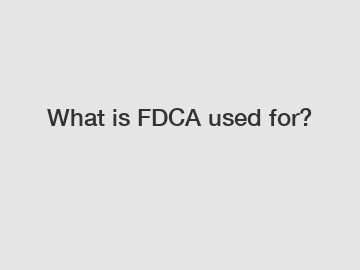What is FDCA used for?
What is FDCA Used For?
The Food, Drug, and Cosmetic Act (FDCA) is a crucial piece of legislation that plays a significant role in ensuring the safety and efficacy of food, drugs, and cosmetics in the United States. Enacted in 1938, the FDCA provides the framework for the regulation and oversight of these products, aiming to protect public health and promote consumer safety. This article will delve into the primary purposes and functions of the FDCA in a comprehensive manner.
Ensuring the Safety of Food Products.

H2: Regulating Food Production and Distribution.
One of the primary objectives of the FDCA is to regulate the production, distribution, and sale of food products to ensure their safety for consumption. The Act provides the U.S. Food and Drug Administration (FDA) with the authority to establish and enforce safety standards for food manufacturers and processors. Under the FDCA, food producers must adhere to strict guidelines for cleanliness, labeling, and packaging. The FDA has the power to inspect food facilities, issue warning letters or recalls when necessary, and take legal action against companies that violate the regulations. The FDCA also requires that food additives undergo rigorous testing and obtain FDA approval before being used in any food products.
Preserving the Safety and Efficacy of Drugs.
H2: Regulating the Pharmaceutical Industry.
Another critical aspect of the FDCA is its regulation of the pharmaceutical industry, including prescription and over-the-counter drugs. The Act provides the FDA with the authority to evaluate and approve new drugs before they can be marketed and sold to the public. The FDCA requires drug manufacturers to prove the effectiveness and safety of their products through rigorous clinical trials and comprehensive data submission. The FDA reviews this information and decides whether or not to approve the drug for sale. Additionally, the FDCA requires drug labeling to provide accurate information about the drug's uses, potential risks, and side effects. It also provides the FDA with the power to oversee the manufacturing and distribution processes to ensure compliance with Good Manufacturing Practices (GMP).
Regulating Cosmetic Products.
H2: Ensuring Safety and Accuracy of Cosmetics.
The FDCA also regulates the cosmetic industry to ensure the safety and accuracy of cosmetic products. Although cosmetics are not subject to pre-market approval like drugs, the FDCA requires cosmetic manufacturers to ensure that their products are safe for use and properly labeled. The FDA has the authority to inspect cosmetic facilities, issue warnings or recalls if necessary, and take legal action against companies that violate the regulations. The FDCA also prohibits the sale of adulterated or misbranded cosmetics that may pose health risks to consumers. Additionally, the FDA works to identify and ban harmful substances or ingredients commonly used in cosmetics.
Monitoring Imports and International Standards.
H2: Regulatory Oversight of Imported Products.
The FDCA also plays a vital role in monitoring and regulating imported food, drugs, and cosmetics. The Act empowers the FDA to review and inspect imported products to ensure they meet the same safety standards as domestically produced items. The FDCA allows the FDA to refuse entry of any product that fails to comply with regulatory requirements. It also provides legal avenues for the FDA to take enforcement actions against foreign manufacturers violating U.S. standards. Furthermore, the FDCA facilitates international collaboration and harmonization of regulations and standards to ensure the safety and quality of imported products.
Conclusion.
The Food, Drug, and Cosmetic Act (FDCA) is a comprehensive piece of legislation that serves to protect public health and promote consumer safety in the United States. By regulating the production, distribution, and labeling of food, drugs, and cosmetics, the FDCA ensures their safety, efficacy, and accurate representation. It establishes the authority of the FDA to oversee and enforce compliance with the regulations, inspect facilities, issue recalls, and take legal action when necessary. If you have any further questions about the FDCA or need assistance, please do not hesitate to contact us.
Are you interested in learning more about 1427195-22-9, 956477-67-1, 957060-94-5? Contact us today to secure an expert consultation!


